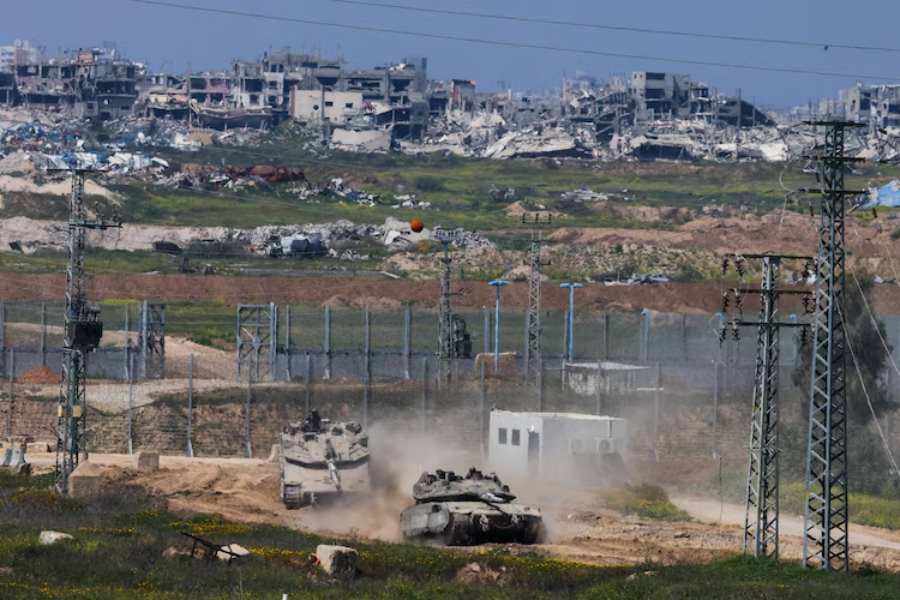The conflict in Gaza has erupted once again following the collapse of a tenuous ceasefire, with the Israel Defense Forces (IDF) launching relentless strikes across the territory. Overnight bombardments have claimed the lives of at least 500 Palestinians, primarily women and children, according to Gaza’s civil defense authorities. The renewed military offensive signals an escalation in hostilities, leaving the region in turmoil and prompting an international outcry.
Israel announced that its forces have refocused ground operations in central Gaza, with an emphasis on dismantling Hamas’ remaining infrastructure. In the hours leading up to the attacks, Israeli aircraft dropped leaflets in several areas, warning civilians to evacuate immediately. The leaflets carried chilling messages, with one stating, “The world map will not change if all the people of Gaza vanish.” Another leaflet urged residents to flee before the implementation of what it called “Trump’s forced plan,” implying a broader strategy for population displacement.
In a video statement, Israeli Defense Minister Israel Katz warned that further evacuations in Gaza would be forthcoming, urging residents to seek alternative refuge outside of the enclave. “Take the advice of the U.S. President. Return the hostages and eliminate Hamas, and other options will open up for you—including leaving for other places in the world,” Katz stated. The remarks have raised concerns over forced displacement, with humanitarian organizations denouncing the rhetoric as a violation of international law.
Israel’s escalation has led to widespread destruction, with homes, hospitals, and infrastructure reduced to rubble. Palestinian officials report that more than 170 children and 90 women have been among those killed since the ceasefire ended on Tuesday night. At least 678 others have been wounded, further overwhelming Gaza’s already crippled medical system. The Ministry of Health in Gaza also reported that an airstrike killed a United Nations staffer, with five others sustaining severe injuries. The IDF denied involvement, stating, “Contrary to reports, the IDF did not strike a UN compound in Deir el Balah.”
Meanwhile, Israeli Prime Minister Benjamin Netanyahu addressed troops on Wednesday, warning that a “larger front” could soon open in the West Bank. His government has intensified security operations under Operation Iron Wall, leading to a significant military presence in the occupied territories. Netanyahu reaffirmed Israel’s aggressive stance, stating, “Negotiations will only take place under fire. Hamas has already felt the presence of our force in the last 24 hours, and I assure you: This is just the beginning.”
The renewed campaign has sparked mass protests across Israel, particularly from the families of hostages still held by Hamas. The Hostage Families’ Forum issued a statement condemning the government’s actions, stating, “The greatest fear of the families, the kidnapped, and the citizens of Israel has come true. The Israeli government has chosen to give up on the kidnapped.” As of now, 59 hostages remain in Gaza, with 24 presumed to be alive, including American-Israeli citizen Edan Alexander.
Israeli officials have defended the strikes, describing them as a “different form of negotiating” intended to pressure Hamas into releasing the remaining hostages. One official told ABC News, “They got hammered last night, and they’re going to continue to be hammered until we get the hostages out.” The IDF also confirmed it had targeted several Hamas military sites, including a facility in northern Gaza preparing to launch rockets into Israel and a naval site allegedly used by Hamas and Palestinian Islamic Jihad.
The situation remains volatile, with right-wing Israeli ministers pushing for even more aggressive action. Far-right Minister Itamar Ben Gvir and his party have rejoined Netanyahu’s coalition after previously leaving when the ceasefire went into effect earlier this year. Political analysts suggest that Netanyahu’s government faces growing instability, particularly with an upcoming vote on Israel’s budget in March. If the coalition fails to pass the budget, Israeli law dictates that the government would collapse, potentially forcing new elections.
As tensions continue to rise, Gaza remains trapped in a cycle of devastation and despair. With border crossings closed and no safe escape routes, civilians face an uncertain and harrowing future. The international community has renewed calls for de-escalation, but with both sides entrenched in their positions, peace remains elusive. Netanyahu has made it clear that Israel’s military operations will continue at full force, reinforcing the grim reality that the worst may still be ahead for Gaza and its people.
